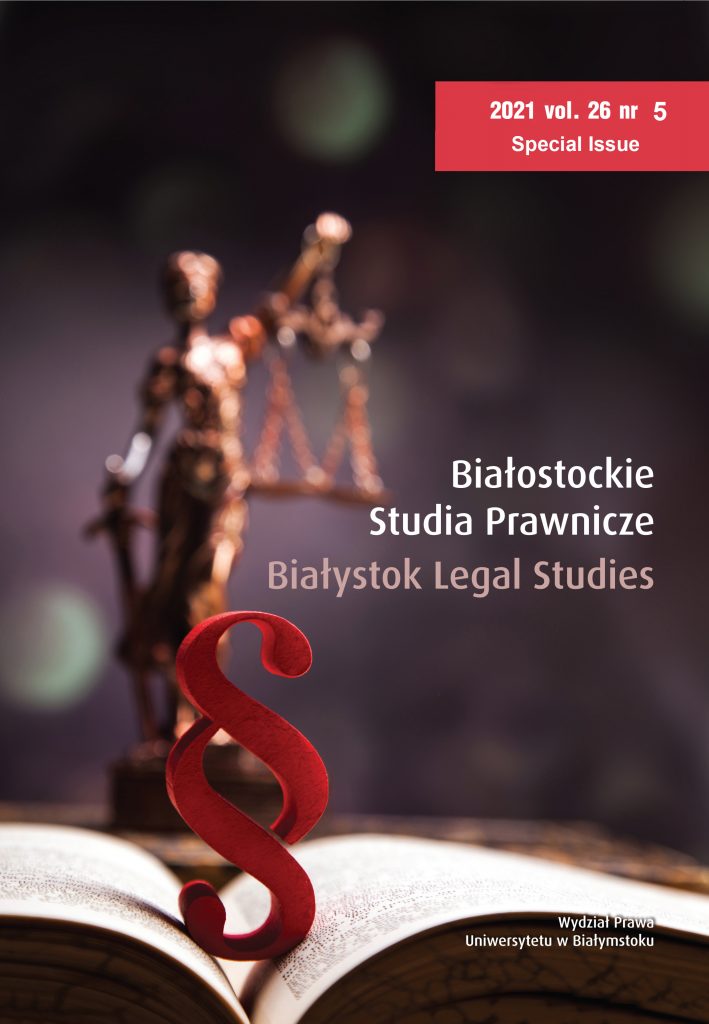The Paris Agreement 5 Years Later: The Challenges of Climate Finance and Multilateral Development Banks
Słowa kluczowe:
climate finance, green bond, multilateral development bank, Paris AgreementAbstrakt
In all matters regarding climate change, the modern world presents complex challenges which highlight how investments in infrastructure have as of yet been inconclusive. The emission percentages calculated by relevant studies demonstrate the need for long-term investments in infrastructures, to ultimately reduce the impact on the environment and our health. To this end, in alignment with the principles expressed in the Paris Agreement – reducing global warming and incentivising a zero-emission transportation system – and the Sustainable Development Goals (SDGs), these new infrastructures will require a structural change that can be guaranteed by multilateral development banks (MDBs), given their nature, especially within developing countries. MDBs play an important role in supporting local governments, on the one hand creating a prosperous environment for sustainable infrastructures and, on the other, providing innovative financial instruments that could increase the financial sector’s participation. In this paper, aft er a brief excursus on the Paris Agreement’s role in the global climatic crisis, there will be an evaluation of the relations between MDBs and climate finance, with a focus on green bonds.Bibliografia
ADB, High Level MDB Statement for publication at the UNSG Climate Action Summit, 22 September 2019.
Barrett S., Carraro C., De Melo J., Towards a Workable and Effective Climate Regime, London 2015.
Bartosch S. et al., Aligning Investments with the Paris Agreement Temperature Goal. Challenges and opportunities for multilateral development banks, Germanwatch & NewClimate Institute, September 2018.
Bartosch S. et al., Toward Paris Alignment. How the Multilateral Development Banks Can Better Support the Paris Agreement, World Resources Institute, December 2018.
Bodansky D., The Legal Character of the Paris Agreement, “RECIEL” 2016, vol. 25, no. 2.10.1111/reel.12154
Boon K., The Rio Declaration and its Influence on International Environmental Law, “Singapore Journal of Legal Studies” 1992.
Buchner B., Falconer A., Hervé-Mignucci M., Trabacchi C., Brikman M., The landscape of climate finance, “Climate Policy Initiative” 2011, vol. 27.
Climate Action Tracker, Paris Agreement turning point, Wave of net zero targets reduces warming estimate to 2.1 C in 2100, All eyes on 2030 targets, 2020, available here: https://climateactiontracker.org/documents/829/CAT_2020–12-01_Briefing_GlobalUpdate_Paris5Years_Dec2020.pdf.
COP 24 Katowice 2018, Katowice Rulebook, Getting ready for the implementation era, Ministry of the Environment of the Republic of Poland, Bureau of the COP24 Presidency, Warsaw 2019, https://cop24.gov.pl/fileadmin/DEKLARACJE/Katowice_Ruleboo_E-BOOK_mini.pdf.
Cuomo P., La responsabilità da illecito internazionale in materia di danno ambientale, “Diritto e processo, Derecho y proceso – Right & Remedies” 2020.
D’souza R., Can multilateral development banks deliver on promise of US$ 100 billion in climate finance?, Observer Research Foundation, 2020.
Dreher A., The Development and Implementation of IMF and World Bank Conditionality, Hamburg Institute of International Economics (HWWA) Discussion Paper no. 165, Hamburg 2002.
E3G, Asian Development Bank Fossil fuel exclusion policies, November 2020, https://www.e3g.org/bank-metrics/fossil-fuel-exclusion-policies-adb/.
EBRD, Energy Sector, 2013.
EIB, EIB Climate Awareness Bonds, Allocations by project for H1, 2020, https://www.eib.org/en/investor_relations/documents/eib-cab-projects.htm.
EIB, EIB Group Climate Bank Roadmap 2021–2025, 2020, https://www.eib.org/attachments/thematic/eib_group_climate_bank_roadmap_en.pdf.
EticaNews, Gbpa, BEI prima banca di sviluppo per emissioni di green bond, 10 July 2020, https://www.eticanews.it/in-breve/gbpa-bei-prima-banca-di-sviluppo-per-emissioni-di-green-bond/.
Gunter T., World Bank Environmental Reform: Revising Lessons from Agency Theory, “International Organization” 2005, vol. 59, no. 3.10.1017/S0020818305050265
Henze V., Emissions and Coal Have Peaked as Covid-19 Saves 2.5 Years of Emissions, Accelerates Energy Transition, “New Energy Outlook” 27 October 2020, https://about.bnef.com/blog/emissions-and-coal-have-peaked-as-covid-19-saves-2–5-years-of-emissions-accelerates-energy-transition/.
ICMA, Green Bond Principles Voluntary Process Guidelines for Issuing Green Bonds, June 2018, https://www.icmagroup.org/assets/documents/Regulatory/Green-Bonds/Green-Bonds-Principles-June-2018–270520.pdf.
IFC, Climate Investment Opportunities in Emerging Markets. An IFC Analysis, Washington D.C. 2016.
Joint Report on Multilateral Development Banks 2018, Climate Finance, June 2019.
Ketterer J. A., Andrade G., Netto M., Haro M. I., Transforming green bond markets: using financial innovation and technology to expand green bond issuance in Latin America and the Caribbean, Inter-American Development Bank, 2019.10.18235/0001900
Kramer L., Manuale di diritto comunitario per l’ambiente, Milan 2002.
Madge G., New global record ‘likely’ within five years, UK Met Office, 30 Jan 2020, https://www.metoffice.gov.uk/about-us/press-office/news/weather-and-climate/2020/decadal-forecast-2020.
Masson-Delmotte V., Zhai P., Pörtner H.-O., Roberts D., Skea J., Shukla P. R., Pirani A., Moufouma-Okia W., Péan C., Pidcock R., Connors S., Matthews J. B. R., Chen Y., Zhou X., Gomis M. I., Lonnoy E., Maycock T., Tignor M. and Waterfield T. (eds), IPCC, 2018: Global Warming of 1.5°C. An IPCC Special Report on the impacts of global warming of 1.5°C above pre-industrial levels and related global greenhouse gas emission pathways, in the context of strengthening the global response to the threat of climate change, sustainable development, and efforts to eradicate poverty, Intergovernmental Panel on Climate Change, 2019, https://www.ipcc.ch/site/assets/uploads/sites/2/2019/06/SR15_Full_Report_Low_Res.pdf.
Montini M., L’accordo di Parigi sui cambiamenti climatici, “Rivista giuridica ambiente” 2015, vol. 4.
Nespor S., La lunga marcia per un accordo globale sul clima, dal Protocollo di Kyoto all’Accordo di Parigi, “Rivista trimestrale di diritto pubblico” 2016, vol. 1.
Nieldon D., Tierney M., Delegation of International Organizations: Agency Theory and World Bank Environmental Reform, “International Organization” 2003, vol. 57, no. 2.10.1017/S0020818303572010
Oxfam, Climate Finance Shadow Report 2020 – Assessing Progress towards the $100 Billion Commitment, Oxfam International, October 2020, https://www.oxfam.org/en/research/climate-finance-shadow-report-2020.
Pavoni S., Will climate changes cause the next crisis?, “The Banker” 1 September 2017, https://www.thebanker.com/Markets/Commodities-Energy/Will-climate-change-cause-the-next-financial-crisis?ct=true.
Stiglitz J., Failure of the Fund: Rethinking the IMF Response, “Harvard International Review” 2001, vol. 23, no. 2.
Thwaites J., The Good, the Bad and the Urgent: MDB Climate Finance in 2019, World Resources Institute, 2020, https://www.wri.org/insights/good-bad-and-urgent-mdb-climate-finance-2019.
Tuhkanen H., Green bonds: a mechanism for bridging the adaptation gap?, SEI working paper, Stockholm 2020.
UNEP, The Emissions Gap Report 2018, Nairobi 2018, https://www.unep.org/resources/emissions-gap-report-2018.
Weikmans R., J. Timmons Roberts, The International Climate Finance Accounting Muddle: Is There Hope on the Horizon?, “Climate and Development” 2017, vol. 11.10.1080/17565529.2017.1410087
Weiss F. B., The Evolution of International Environmental Law, “Japanese Yearbook of International Law” 2011, vol. 54.
World Bank, Adjustment Lending Retrospective Final Report, Washington D.C. 2001.
World Bank Group, Energy Sector Strategy, 2013.
World Bank Group, Environmental and Social Framework, 2016.
World Bank Group, World Bank Group Announcements at One Planet Summit, 12 December 2017, https://www.worldbank.org/en/news/press-release/2017/12/12/world-bank-group-announcements-at-one-planet-summit.



